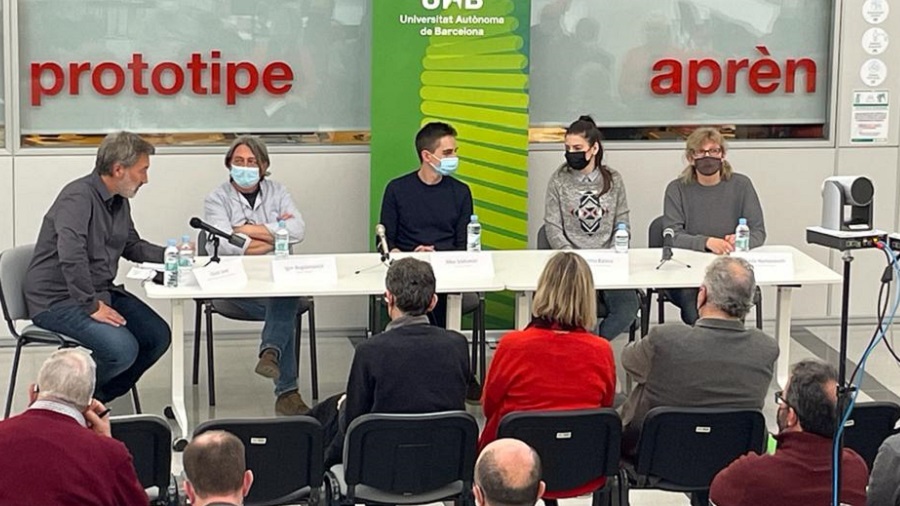University community members debate on an "unjustifiable"conflict
The UAB began its conference series "The UAB, in Favour of Peace" with a debate on the armed conflict in Ukraine at the Journals Hall of the Humanities Library. The event brought together four members of the university community born in eastern Europe to give their view as citizens of countries directly or indirectly involved in the current war and its consequences. A conflict which demonstrates, according to Rector Lafuente, that "violence is never the solution".

According to Igor Bogdanovich, lecturer and OpenLabs technician, now the problem lies in the fact that "when the first bullet is shot, it is already too late". Bogdanovich recalled the wars that took place in the 1990s in former Yugoslavia, the country in which he was born, to warn the audience that too often, peace negotiations "leave one of the parts dicontent" and perpetuate "a neverending spiral". All four speakers coincided in viewing this current conflict as an "unjustifiable" situation, as expressed by Faculty of Translation and Interpreting lecturer Liudmila Navtanovich.
Navtanovich, originally from Russia, affirmed that the Russian society "did not expect" to be in war with Ukraine, and highlighted many of the connections betweent he two countries, particularly thanks to the "understanding factor" represented by two closely related languages as are Russian and Ukrainian. In contrast, the other three speakers considered that the war was foreseeable. As pointed out by Ukranian Max Sokhatski, former student of the Faculty of Psychology, "the war has been going on for eight years now", since the Maidan uprising and the start of the conflict with the Donbas region. According to Sokhatski, "the ties between Russians and Ukranians have been severed" due to the invasion and the effects of the conflict will be felt "for generations".
When discussing responsibilities for the current conflict, both Bogdanovich and Costina Banica, graduate student of the Faculty of Arts & Humanities and born in Rumania, emphasised the need to point to "specific individuals" and not a whole community, although Sokhatski did find himself "in favour of speaking of a collective responsibility" given that there seems to be a great degree of supporters of Vladimir Putin among Russia's society. Navtanovich specified that "many people are against him, but are afraid" to speak out, since anyone protesting on the street or in social networks, "knows what awaits them". Banica compared the repressive role of Russia with historical precedents, and reminded the audience that, here in Western Europe, "no one understands what the Soviet Union represented in the east". She put emphasis on the importance historical events have which are "still recent" and that go back to the Second World War, and considered that even if Rumania historically has disputed over the land with Ukraine, "we have become closer" now because, "when there are refugees, we must help them".
The debate was moderated by Oscar Jané, lecturer at the Department of Modern and Early Modern History, and the final speech was given by UAB Rector Lafuente, who highlighted that the university "will always be a place committed to peacebuilding". He voiced his concern for how the events could unfold, particularly with regards to the dangers of a nuclear war which, as Navtanovich affirmed, cannot be ruled out. Rector Lafuente ended the event with an outline of the actions the UAB proposed to give support to those affected by the conflict, and explainded that the campus is prepared to welcome university community members needing help to continue their academic activities, whether that be students, lecturers or researchers. In this sense, he explained that the UAB is preparing "an additional budget to be set aside for study grants" for the 2022/23 academic year.
The UAB, with Sustainable Development Goals
Peace, justice and strong institutions